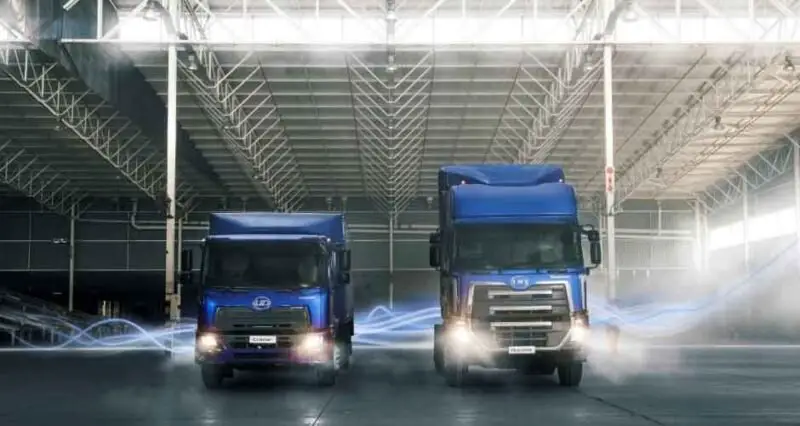
The trucking business is vital to the global economy, carrying commodities and materials over long distances. Traditional trucking techniques, on the other hand, have a substantial environmental impact, adding to air pollution and greenhouse gas emissions. As organisations grow more conscious of their environmental impact, many are searching for methods to implement more sustainable practices, especially in transportation.
Sustainable trucking aims to reduce the environmental impact of trucking operations while preserving efficiency and profitability. This can be accomplished through various measures, such as using alternative fuels, route optimisation, and reduced idling time. This is where Adblue comes in. But, what is Adblue?
Adblue, a liquid solution that helps to minimise emissions from diesel engines, is a critical component of sustainable shipping. Companies such as Euroblue possess expertise in sustainable trucking practices, which can help businesses comply with regulatory requirements and improve their brand reputation among environmentally conscious consumers.
In this post, we’ll look at the value of sustainable trucking for businesses and the role of Adblue in lowering emissions and improving air quality. We’ll also discuss balancing Adblue consumption and fuel economy, best practices for sustainable trucking, and real-world examples of organisations that have successfully embraced sustainable trucking operations. Finally, we’ll discuss some of the problems and limitations of sustainable trucking and options for firms wishing to implement more environmentally friendly transportation operations.
The Importance of Sustainable Trucking
The trucking business is vital to the Australian economy, carrying commodities and materials over long distances. Traditional trucking techniques, on the other hand, have a substantial environmental impact, adding to air pollution and greenhouse gas emissions. As Australian businesses grow more conscious of their environmental impact, many are searching for methods to implement more sustainable practices, especially in their transportation operations.
In Australia, sustainable trucking entails lowering the environmental effect of trucking operations while preserving efficiency and profitability. This can be accomplished through various measures, such as using alternative fuels, route optimisation, and reduced idling time. Adblue, a liquid solution that helps to minimise emissions from diesel engines, is an essential component of sustainable trucking in Australia.
Aside from lowering emissions and improving air quality, sustainable transportation in Australia provides several advantages to businesses, including:
- Compliance with regulatory requirements: The Australian government has implemented several laws to reduce emissions from the transportation industry. Businesses can ensure compliance with these requirements and avoid potential penalties by using sustainable trucking practices.
- Improving brand reputation: As Australian consumers become more environmentally conscious, they seek companies prioritising sustainability. Businesses can strengthen their brand reputation and separate themselves from the competition by implementing sustainable trucking practices.
- Cost savings: Sustainable trucking practices can also lead to cost savings for Australian firms. Optimising routes and lowering idle time, for example, can minimise fuel use, resulting in cheaper fuel expenses.
Sustainable transportation allows Australian firms to reduce their environmental footprint while retaining efficiency and profitability. Businesses may position themselves as sustainability leaders and fulfil the growing demand for eco-friendly transportation options by implementing sustainable trucking practices.
Sustainable Trucking Strategies
Businesses can use a range of ways to establish sustainable trucking operations. Among these strategies are:
- Utilisation of alternative fuels: Using alternative fuels, such as biodiesel or natural gas, is one of the most effective strategies to minimise emissions from transportation operations. These fuels emit fewer pollutants than standard diesel fuel and can assist businesses in meeting regulatory requirements while lowering their environmental effect.
- Route optimisation: By minimising the distance travelled and eliminating idle time, trucking routes can help to minimise fuel consumption and emissions. This is possible thanks to GPS technology and route planning software.
- Use of Adblue: AdBlue is a liquid solution that helps to lower diesel engine emissions by converting harmful nitrogen oxides into innocuous nitrogen and water. Businesses can reduce their environmental impact and enhance air quality by utilising Adblue.
- Vehicle maintenance: Regularly maintaining trucks can guarantee that they are working at peak efficiency, minimising fuel consumption and pollutants. This includes oil changes, tyre rotations, and regular engine tune-ups.
- Collaboration with suppliers: Companies can implement sustainable practices throughout the supply chain, such as adopting environmentally friendly packaging and shipping techniques.
By implementing these measures, businesses can achieve sustainable trucking operations and reduce their environmental effect while retaining efficiency and profitability. As the demand for environmentally friendly transportation grows, sustainable trucking will become increasingly vital for firms trying to stay competitive and meet customer demands.
Achieving a Balance Between Adblue Use and Fuel Efficiency
While Adblue can help lower emissions from diesel engines, it can also influence fuel efficiency. AdBlue is a liquid solution injected into diesel engines’ exhaust systems to convert hazardous nitrogen oxides into safe nitrogen and water. However, using Adblue might increase fuel consumption because the engine has to work harder to burn the mixture of fuel and Adblue.
Businesses in Australia must balance Adblue use with fuel economy to achieve sustainable trucking operations. This can be accomplished by a variety of methods, including:
- Route optimisation: By minimising the distance travelled and lowering idle time, trucking routes can help to cut fuel consumption and emissions. Businesses can reduce the quantity of gasoline and Adblue required during transportation operations by optimising ways.
- Reducing idle time: Idle time can substantially impact fuel usage and emissions. Businesses can reduce the quantity of gasoline and Adblue consumed during transportation operations by minimising idling time.
- Vehicle maintenance: Truck maintenance can guarantee that they work efficiently, minimising fuel consumption and pollutants. This includes oil changes, tyre rotations, and regular engine tune-ups.
- Utilisation of fuel-efficient vehicles: Investing in fuel-efficient cars can assist in reducing fuel consumption and emissions while still meeting regulatory standards for Adblue.
Businesses can achieve sustainable transportation practices while preserving efficiency and profitability by implementing these solutions, which balance the use of Adblue with fuel economy. Companies in Australia must prioritise sustainable trucking operations to remain competitive and meet client demands as demand for eco-friendly transportation choices grows. They may contribute to a more sustainable future for the trucking industry and the environment as a whole by doing so.
In addition to using Adblue, Euroblue offers other sustainable trucking strategies, such as route optimisation and alternative fuels. By using these strategies, businesses can reduce fuel consumption and lower emissions, resulting in cost savings and a smaller environmental footprint.
Sustainable Trucking Best Practices
Adopting sustainable trucking methods can give a variety of benefits to Australian firms, including increased brand reputation, lower costs, and regulatory compliance. Businesses can implement the following best practices to establish sustainable trucking practices:
- Invest in fuel-efficient automobiles: Fuel-efficient vehicles can help reduce fuel consumption and emissions while following Adblue use regulations. Hybrid and electric vehicles are also gaining popularity in transportation, giving even greater fuel efficiency and lower emissions.
- Drivers should be taught eco-friendly driving techniques: Training drivers on environmentally friendly driving strategies such as limiting idling time, maintaining a constant speed, and avoiding rapid acceleration and braking can assist in minimising fuel consumption and emissions. This can improve driving safety while also lowering maintenance expenses.
- Collaborate with suppliers: Collaboration with suppliers can guarantee that sustainable practices are used across the supply chain, decreasing the environmental effect of transportation operations.
Businesses can achieve sustainable transportation by using these best practices, decreasing their environmental effect and boosting their financial line. Sustainable trucking methods can deliver significant economic savings for enterprises in addition to ecological benefits. Businesses can increase their profitability and market competitiveness by reducing fuel usage and maintenance costs.
Finally, sustainable trucking methods are becoming increasingly vital for Australian enterprises. Businesses can decrease their environmental effect, boost their brand reputation, and save money by using eco-friendly practices such as investing in fuel-efficient vehicles and optimising routes. Companies must prioritise sustainable trucking operations to remain competitive and meet client requests as the demand for sustainable transportation choices grows.
Difficulties and Limitations
Sustainable transportation strategies assist Australian businesses, but their implementation could be better. New technologies like fuel-efficient cars and alternative fuels are expensive to adopt. Some organisations may need help justifying the adoption of these technologies due to their high initial costs. The need for infrastructure upgrades is another obstacle. Installing electric vehicle charging stations and alternative fueling stations is necessary for sustainable transportation. With these improvements, organisations may adopt sustainability.
Alternative fuels like biodiesel and hydrogen are scarce in Australia, making green techniques difficult. Businesses need help to adopt sustainable practices that use these scarce resources. Companies have many options to overcome these constraints. Government incentives like tax cuts and subsidies can help offset new technology integration expenses. Sustainable practices throughout the supply chain can be accomplished through supplier collaboration, cutting costs and boosting the availability of environmentally friendly technology and fuels.
Sustainable behaviours can be promoted by advocating for infrastructure upgrades like alternate fuelling stations. Australian transportation businesses can adopt sustainability by addressing these challenges. This boosts brand reputation and saves money, making the transportation industry and environment more sustainable.
Conclusion
Sustainable trucking practices are becoming increasingly crucial to Australian enterprises. Businesses can reduce their environmental effect, boost their brand reputation, and save money by using eco-friendly methods such as investing in fuel-efficient vehicles, teaching drivers about eco-friendly driving habits, and optimising routes.
While sustainable trucking practices have some challenges and limitations, such as the cost of implementing new technologies and the need for infrastructure improvements, businesses can overcome these obstacles by seeking government incentives, collaborating with suppliers, and advocating for infrastructure improvements.
We urge firms to implement sustainable trucking methods to reduce environmental effects, cut expenses, and remain competitive. Businesses can seek advice from industry associations, government agencies, and sustainability specialists for further information on sustainable trucking operations.
FAQs
What are sustainable trucking practices?
Sustainable trucking practices are eco-friendly steps that companies can take to lower their impact on the environment, boost their brand’s image, and save money. Some of these practices are buying cars that use less gas, teaching drivers how to drive eco-friendly, finding the best routes, and working with suppliers.
Why are sustainable trucking practices essential?
Sustainable trucking practices are essential because they help companies lower their impact on the environment, follow the rules, and boost their brand’s image. Sustainable trucking practices can also help businesses save money by reducing fuel use and repair costs.
What are the benefits of investing in fuel-efficient vehicles?
Buying fuel-efficient vehicles is one-way businesses reduce fuel use and pollution while meeting Adblue usage standards. Hybrid and electric vehicles are also becoming more popular in the trucking business because they use less fuel and produce fewer emissions.
How can businesses train drivers on eco-friendly driving techniques?
Companies can teach their drivers how to drive environmentally friendly by giving them education and training programmes that focus on cutting down on idle time, keeping the speed steady, and not speeding up or slowing down suddenly. This can also make driving safer and lower the cost of repairs.
How can businesses optimise trucking routes?
Businesses can use GPS technology and route planning tools to ensure that trucks travel the shortest distances and spend less time sitting still. Along with faster arrival times, this can also lower shipping costs.
What are the challenges associated with sustainable trucking practices?
The cost of adopting new technologies, the need for infrastructure improvements, and the need for government incentives are some problems with sustainable trucking practices. But companies can get around these problems by asking the government for help, working with their suppliers, and pushing for better infrastructure.
Where can businesses find further information on sustainable trucking practices?
Businesses can talk to industry groups, government agencies, and sustainability experts for more information on environmentally friendly trucking methods. Many websites and magazines offer information on ecologically friendly trucking methods.

